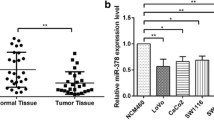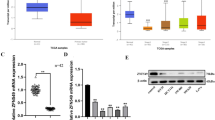Abstract
To analyze the anti-tumor mechanism of Baicalin in human colon cancer. The MTT assay and colony formation assay demonstrated that Baicalin treatment inhibits the proliferation of DLD1 and HCT-116 cells. The apoptosis rates were induced upon Baicalin treatment and which was determined by FACS. The qPCR and western blot analysis showed that Baicalin promotes expression of DKK1 (Dickkopf), an important antagonist of Wnt signaling pathway, thereby reduces the expression of its downstream protein β-catenin and c-Myc. Reduction of DKK1 expression by siRNA attenuates β-catenin and c-Myc expression. microRNA-217 (miR-217) is decreased upon Baicalin treatment. Moreover, DKK1 is identified as the direct downstream target gene of miR-217 through the dual-luciferase reporter assay. miR-217/DKK1-mediated inhibition of Wnt signaling pathway participate in apoptosis induced by Baicalin.






Similar content being viewed by others
References
Bahrami A et al (2017) Therapeutic potential of targeting Wnt/beta-catenin pathway in treatment of colorectal cancer: rational and progress. J Cell Biochem 118:1979–1983. https://doi.org/10.1002/jcb.25903
Corsini LR et al (2012) The role of microRNAs in cancer: diagnostic and prognostic biomarkers and targets of therapies. Expert Opin Ther Targets 16(Suppl 2):S103–S109. https://doi.org/10.1517/14728222.2011.650632
Ding Y, Colozza G, Sosa EA, Moriyama Y, Rundle S, Salwinski L (2018) Bighead is a Wnt antagonist secreted by the Xenopus Spemann organizer that promotes Lrp6 endocytosis. Proc Natl Acad Sci USA 115(39):E9135–E9144. https://doi.org/10.1073/pnas.1812117115
Donald G, Hertzer K, Eibl G (2012) Baicalein—an intriguing therapeutic phytochemical in pancreatic cancer. Curr Drug Targets 13:1772–1776
Lv C et al (2017) MiR-31 promotes mammary stem cell expansion and breast tumorigenesis by suppressing Wnt signaling antagonists. Nat Commun 8:1036. https://doi.org/10.1038/s41467-017-01059-5
Rui Y et al (2018) LncRNA HOTTIP mediated DKK1 downregulation confers metastasis and invasion in colorectal cancer cells. Histol Histopathol. https://doi.org/10.14670/hh-18-043
Sarkar FH, Li Y, Wang Z, Kong D (2010) The role of nutraceuticals in the regulation of Wnt and Hedgehog signaling in cancer. Cancer Metastasis Rev 29:383–394. https://doi.org/10.1007/s10555-010-9233-4
Siegel RL, Miller KD, Jemal A (2017) Cancer statistics, 2017. CA Cancer J Clin 67:7–30. https://doi.org/10.3322/caac.21387
Su Y, Simmen RC (2009) Soy isoflavone genistein upregulates epithelial adhesion molecule E-cadherin expression and attenuates beta-catenin signaling in mammary epithelial cells. Carcinogenesis 30:331–339. https://doi.org/10.1093/carcin/bgn279
Wang C, Liao H, Sun H, Zhang Y, Cao Z (2018) MicroRNA-3064-3p regulates the differentiation of cementoblasts through targeting DKK1. J Periodontal Res 53(5):705–713. https://doi.org/10.1111/jre.12554
Wu H, Wang Y, Wu C, Yang P, Li H, Li Z (2016) Resveratrol induces cancer cell apoptosis through MiR-326/PKM2-mediated ER stress and mitochondrial fission. J Agric Food Chem 64:9356–9367. https://doi.org/10.1021/acs.jafc.6b04549
Xiao Y, Yang X, Miao Y, He X, Wang M, Sha W (2016) Inhibition of cell proliferation and tumor growth of colorectal cancer by inhibitors of Wnt and Notch signaling pathways. Oncol Lett 12:3695–3700. https://doi.org/10.3892/ol.2016.5175
Yin P, Wang W, Zhang Z, Bai Y, Gao J, Zhao C (2018) Wnt signaling in human and mouse breast cancer: focusing on Wnt ligands, receptors and antagonists. Cancer Sci 109(11):3368–3375. https://doi.org/10.1111/cas.13771
You W, Wang K, Yu C, Song L (2018) Baicalin prevents tumor necrosis factor-alpha-induced apoptosis and dysfunction of pancreatic beta-cell line Min6 via upregulation of miR-205. J Cell Biochem 119(10):8547–8554. https://doi.org/10.1002/jcb.27095
Zhan T, Rindtorff N, Boutros M (2017) Wnt signaling in cancer. Oncogene 36:1461–1473. https://doi.org/10.1038/onc.2016.304
Acknowledgements
This work was supported by the National Natural Science Foundation of China (Grant No. 81603020), Shanxi Province Science Foundation for Youths (201601D021108).
Author information
Authors and Affiliations
Corresponding author
Ethics declarations
Conflict of interest
The authors declare no competing interests.
Additional information
Publisher’s Note
Springer Nature remains neutral with regard to jurisdictional claims in published maps and institutional affiliations.
Rights and permissions
About this article
Cite this article
Jia, Y., Chen, L., Guo, S. et al. Baicalin induced colon cancer cells apoptosis through miR-217/DKK1-mediated inhibition of Wnt signaling pathway. Mol Biol Rep 46, 1693–1700 (2019). https://doi.org/10.1007/s11033-019-04618-9
Received:
Accepted:
Published:
Issue Date:
DOI: https://doi.org/10.1007/s11033-019-04618-9




